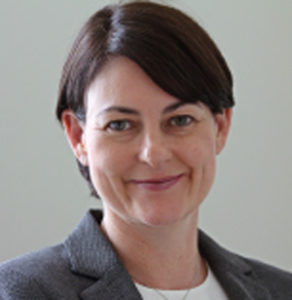 Rachael Fleurence
Rachael Fleurence
Executive Director
National Evaluation System for health Technology Coordinating Center (NESTcc)
Arlington, Virginia
Born in Canterbury, England, and raised in Antibes, France, health economist Rachael Fleurence has always been interested in studying large, complex systems and understanding how to disrupt them to improve them. It’s no coincidence that she’s working on one of the biggest, most complex systems of all – U.S. healthcare.
Early in her career, Fleurence worked for the World Health Organization, which at the time had just launched an initiative to quantify the Global Burden of Disease (GBD). The experience led her to go back to school to pursue a master’s in health economics and a PhD.
After WHO, she worked for a health outcomes research consultancy and then joined the Patient-Centered Outcomes Research Institute (PCORI) in 2012. There, she launched and led a program called PCORnet, an effort involving 130 medical institutions and patient organizations whose mission was to accelerate clinical research.
It was at PCORI that Fleurence became interested in supply chain issues. “One aim of this work was to leverage data generated in the course of care at these health systems using a variety of sources of data, such as electronic health records, claims, billing data, pharmacy data, wearables and mobile technology, and supply chain data; then organize and curate it so it could be used for clinical research purposes, for example, comparative effectiveness studies, and retrospective and prospective clinical studies.
“Supply chain data can be very valuable for these types of studies, particularly for medical devices, which are not always captured directly in EHR data.” Supply chain registries have proved important sources of information to complete the data to support her research, she adds.
In 2017, Fleurence was named executive director of the National Evaluation System for health Technology Coordinating Center, or NESTcc, whose mission is to harness digital data from electronic health records, insurance claims, registries, etc., to evaluate the effectiveness and value of medical equipment and supplies.
Describe a key mentor or event in your life.
In July 2012, when she was at PCORI, “some of the most senior leaders from the healthcare ecosystem – including academia, non-profit, government, private and public sector – came together for a meeting in Palo Alto and developed a vision for increasing the efficiency, cost and timeliness of clinical research in the United States,” she recalls. “The vision was to leverage the digital data transformation that was generating significant levels of data, and the strength and wisdom of patients advocating for better research to support questions that mattered to them. It was a powerful and inspiring meeting, where the energy for change was palpable and where I was inspired to contribute in any role that I could.”
In what way(s) are you a better supply chain leader than you were, say, five or 10 years ago?
“I have learned to look for outstanding talent, support them the best I can, and let them run with things. My strong interest in learning continues to be a strong element of my leadership, but it also looks different than early in my career. Now, I mainly try to stay abreast of large picture and policy developments in our field rather than dive into the details and depths of any one topic.”
Describe the key characteristics of the successful supply chain leader of the future.
- A thirst for learning. “The world is changing so quickly around us that staying on top of key developments in multiple fields is really important,” she says.
- Emotional intelligence. “Hiring and retaining top talent is critical for success, and getting buy-in and support from key stakeholders across the ecosystem.”
